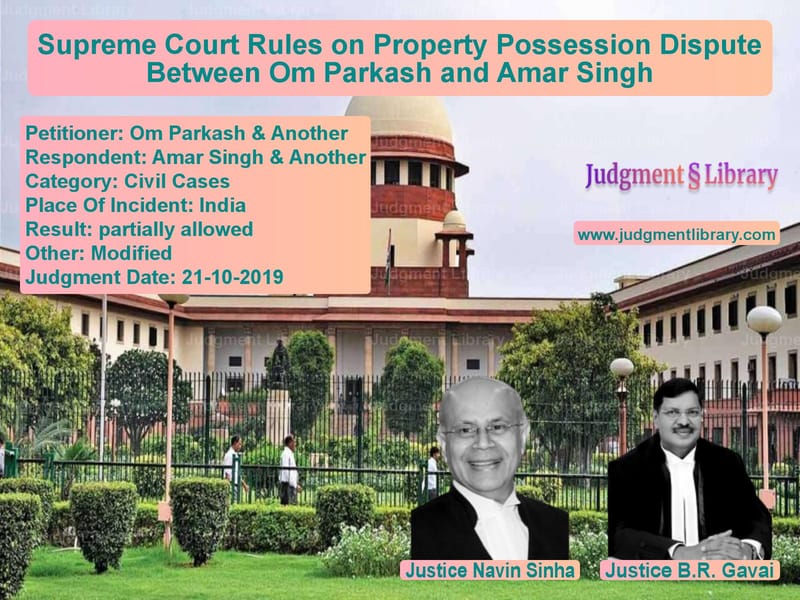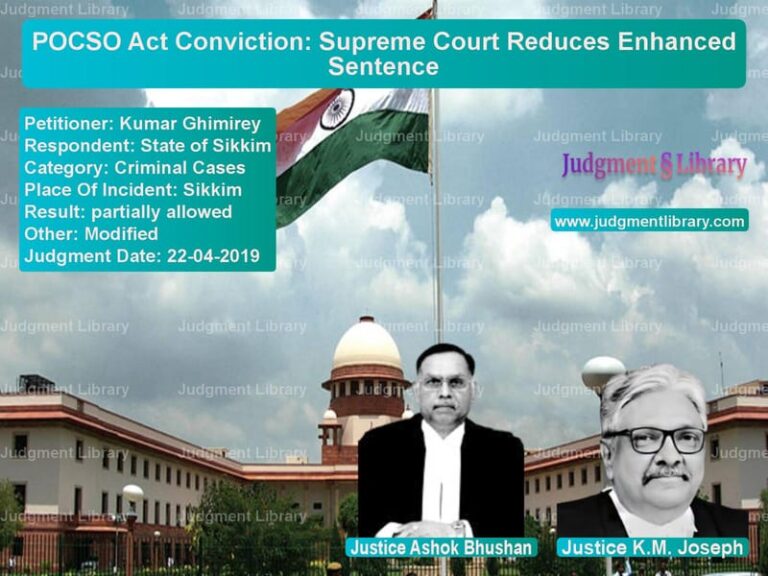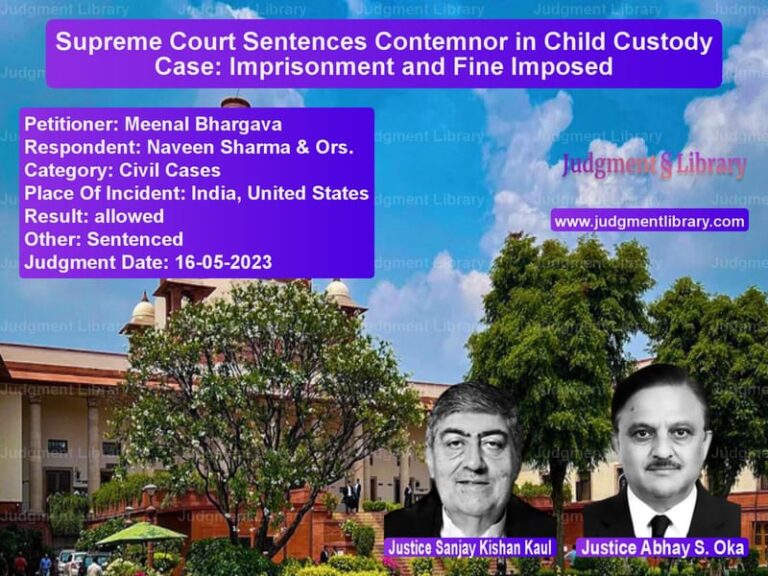Supreme Court Rules on Property Possession Dispute Between Om Parkash and Amar Singh
The Supreme Court recently issued a ruling in the property dispute case between Om Parkash and Amar Singh. This case revolved around the execution of a possession decree and the legality of using police assistance without prior court approval. The Court addressed the complexities of execution proceedings, highlighting the proper procedure for enforcement of possession orders.
Background of the Case
The dispute originated from a property ownership conflict where Om Parkash, the decree-holder, sought possession of a property that was in the control of Amar Singh, the judgment debtor. The key events in the case are:
- Om Parkash successfully won the legal battle over the property, and an execution decree was issued in his favor.
- The execution proceedings were initiated for possession delivery.
- The Tehsildar, anticipating resistance, sought police assistance for executing the possession order.
- Possession was handed over to Om Parkash on October 11, 2013, with the aid of police force.
- Amar Singh challenged the execution, arguing that the use of police force without specific court approval rendered the execution illegal.
- The High Court ruled in favor of Amar Singh, directing that possession be restored to him and the execution proceedings be revived.
- Om Parkash appealed to the Supreme Court.
Arguments by the Petitioner (Om Parkash – Decree Holder)
- Om Parkash argued that he lawfully obtained possession based on a valid execution decree.
- He contended that he did not personally request police assistance; rather, the Tehsildar, fearing law-and-order problems, had sought it on his own.
- The possession was lawfully handed over, and the execution court had already closed the proceedings.
- Om Parkash asserted that reversing the execution order would unfairly deprive him of property that he legally acquired through auction.
Arguments by the Respondent (Amar Singh – Judgment Debtor)
- Amar Singh claimed that the execution was tainted as police assistance was obtained without prior approval from the executing court.
- He argued that possession of a property, even under a valid decree, cannot be taken through brute police force without following proper legal channels.
- He relied on past judicial precedents which held that even a lawful owner cannot take possession unlawfully.
- He requested restoration of possession and fresh adjudication on the execution proceedings.
Supreme Court’s Observations and Judgment
A bench comprising Justices Navin Sinha and B.R. Gavai analyzed the legal aspects of execution proceedings and the use of police assistance. The key observations made by the Court include:
- “Possession of property should be delivered in accordance with law and not by use of brute force, even if the decree-holder is legally entitled to possession.”
- The Court acknowledged that the Tehsildar, acting independently, sought police help fearing trouble during execution.
- The judges agreed with the High Court’s concerns but noted that the judgment debtor had no legal right over the property.
- Instead of ordering a fresh execution proceeding, the Court modified the High Court’s decision, allowing Om Parkash to retain possession.
- The Court warned authorities that in the future, obtaining court approval for police assistance is mandatory before execution.
The Supreme Court ruled that Om Parkash could retain possession but upheld the High Court’s observations on the improper use of police force. The ruling ensured that procedural lapses do not set a precedent for future execution cases.
Key Takeaways from the Judgment
- Police assistance in execution proceedings requires prior court approval.
- Even lawful possession orders must be executed in accordance with legal procedures.
- The Supreme Court emphasized strict adherence to procedural safeguards to prevent misuse of execution decrees.
- The ruling clarifies that judgment debtors cannot exploit procedural lapses to indefinitely delay possession enforcement.
Final Verdict
The Supreme Court’s ruling is a significant judgment in property law, reinforcing the importance of following due process in execution proceedings. While the Court upheld Om Parkash’s possession, it warned against arbitrary use of police force in future execution matters.
This ruling serves as a precedent for all property execution cases, ensuring that possession orders are enforced within the legal framework while protecting the rights of both decree-holders and judgment debtors.
Petitioner Name: Om Parkash & Another.Respondent Name: Amar Singh & Another.Judgment By: Justice Navin Sinha, Justice B.R. Gavai.Place Of Incident: India.Judgment Date: 21-10-2019.
Don’t miss out on the full details! Download the complete judgment in PDF format below and gain valuable insights instantly!
Download Judgment: Om Parkash & Another vs Amar Singh & Another Supreme Court of India Judgment Dated 21-10-2019.pdf
Direct Downlaod Judgment: Direct downlaod this Judgment
See all petitions in Property Disputes
See all petitions in Landlord-Tenant Disputes
See all petitions in Judgment by Navin Sinha
See all petitions in Judgment by B R Gavai
See all petitions in partially allowed
See all petitions in Modified
See all petitions in supreme court of India judgments October 2019
See all petitions in 2019 judgments
See all posts in Civil Cases Category
See all allowed petitions in Civil Cases Category
See all Dismissed petitions in Civil Cases Category
See all partially allowed petitions in Civil Cases Category







